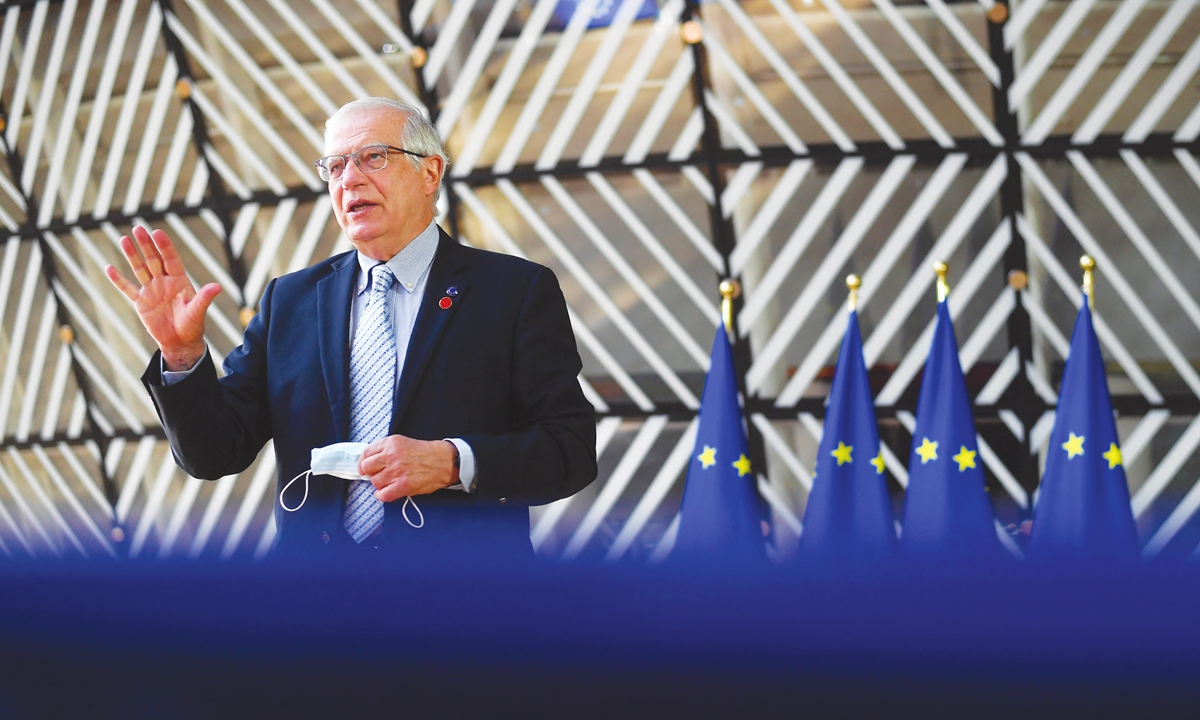
High Representative of the EU for Foreign Affairs Security Policy Josep Borrell. Photo: AFP
Click here to stay tuned with our live updates on Ukraine tensions. EU foreign policy chief Josep Borrell has spoken out in favor of China mediating in the Ukraine crisis, said a South China Morning Post report on Saturday. "There is no alternative… It has to be China, I trust in that," Borrell was quoted.
Borrell's remarks reflect the bloc's expectations of the situation. After all, if the war is prolonged, it will affect Europe's economy, energy sector, inflation and financial market - so the EU hopes to reduce the conflict quickly.
In the past few days, the Western media's coverage has made China's so-called mediation a focus. The Voice of America headline read "China positions itself as mediator between Russia, Ukraine;" while the Daily Mail put it more bluntly, "China says it is willing to mediate between Russia and Ukraine after saying it 'deeply regretted' the war in a sign that Beijing's support for Putin is wavering."
They on one hand want to make China a mediator, but they cannot resist attacking and smearing.
Borrell's latest statement was essentially the same as the West's rhetoric before, which called on China to use its "influence" over Russia to make Moscow stop, said Cui Hongjian, director of the Department of European Studies at the China Institute of International Studies.
"The US and the EU have realized they've been unrealistic, imagining if Russia could be handled, the problem would be over. But there is not just one side to this crisis. And China will never stop a fight in a biased way like the West does - stopping one side while winking at the other," Cui noted.
Therefore, they veneered their intent with a new coat, Cui said. However, whether the so-called mediator role conforms to some of the United Nations' positions, and whether it can achieve the desired purpose, needs to be considered based on China's position.
They know there is no other country that can be a "mediator." But they don't genuinely trust China; they are worried that China has different interests.
This reflects the dilemma for the US and Europe. "They continue to criticize China on Xinjiang- and Taiwan-related affairs. However, they want China to play a bigger role in peace-building. Why should China listen to them and do as they say?" said Zhu Feng, a professor of international relations at Nanjing University.
Ever since the Ukraine crisis broke out, China's moves have been interpreted and derived by Western media with ulterior motives. Zhu said, "'Mediator' is not simply a moral trap set for China. Indeed, China, as a major country, has been promoting peace and talks. But if the West wants China to play a bigger role, it should first stop its malicious campaigns against China."
US Secretary of State Antony Blinken met with his Ukrainian counterpart at Ukraine's border on Saturday. Blinken emphasized that the US and its allies "are, again, looking at everything" to support Ukraine," The New York Times reported. He said both the support to Ukraine, including shipments of weapons and military equipment to Kiev, and the global pressure to Russia will continue until the war is brought to an end, according to the report.
"The Biden administration has all-round support to Ukraine and it won't easily change that stance. This crisis has restarted the confrontations between the West and the East," Zhu noted.
Both Cui and Zhu agreed that China should insist on its principles and position, dealing with the issue in its own way based on its judgments. Being a mediator or not is not what China should consider for now. If there is any necessity, China and the EU can communicate, but it is not what China needs to respond to or act immediately.
The crisis is not just about Ukraine and Russia. China clearly hopes for a cease-fire as soon as possible, but if the West wants a hand from China to mediate, they should at first change their attitude toward Russia and de-escalate the confrontation to create an external environment for the détente. The US and the EU have nearly used up their "sanction cards." They want to have China by their side but they must be aware that it is impossible. China adheres to mutual respect and a win-win approach in developing its relations with the West, and being independent and autonomous is the general principle of China's foreign policy.
The author is a reporter with the Global Times. opinion@globaltimes.com.cn




